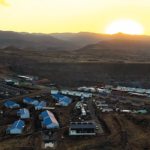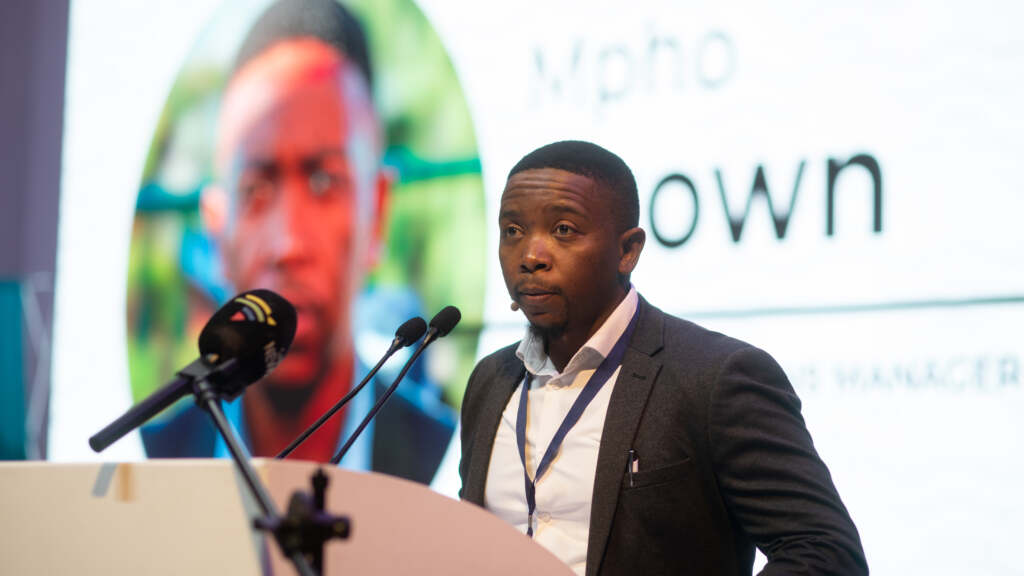The Lesotho Highlands Development Authority (LHDA) held its 2025 Stakeholder Conference in Maseru this week, bringing together key stakeholders to assess the progress of Phase II of the Lesotho Highlands Water Project (LHWP) and strengthen collaborations for long-term impact.
Under the theme “Waves of Change: Strengthening Partnerships for Lasting Change,” the conference followed up on last year’s discussions, deepening engagement on issues like accountability, transparency, and sustainable development.
During the two-day conference, the LHDA provided updates on key areas, including infrastructure and community initiatives under the LHWP, challenges affecting project execution, and improvements made to enhance accountability and governance.
The conference served as a crucial platform for stakeholders—government representatives, affected communities, international development partners, and private sector actors—to contribute insights and shape the future direction of the project.
With LHDA beginning to implement its new 10-year strategic plan, this year’s discussions emphasised responsible governance, collaborative problem-solving, and ensuring that the LHWP continues to deliver shared benefits.
A platform for open dialogue
Officially opening the conference, the LHDA’s Chief Executive, Tente Tente, emphasised the importance of the conference as a platform for open dialogue.
“At a time of transition and strategic renewal, platforms like this are vital,” he said.
“Good governance, accountability, and transparency are not just ideals—we embed them in how we engage with our partners and communities. This conference reaffirms our commitment to listening, adapting, and working collectively to ensure that the Lesotho Highlands Water Project (LHWP) continues to serve the best interests of all stakeholders.”
Tente noted the significance of the rare conference, providing a space for honest and constructive discussions.
“It is not always those with responsibility to implement projects that affect so many lives across the nation’s boundaries who get a chance to have open, candid, and constructive dialogues,” he explained.
Tente stressed that the collaboration between LHDA and stakeholders is key to ensuring sustainable benefits from the project.
“We remain true to our work and purpose, which is to transform project-affected people into project beneficiaries,” Tente added.
He also acknowledged public criticism of the LHDA, and indicated that the authority is open to suggestions for improving operations.
“When it comes to community issues, land use restoration matters, there is a lot of criticism that is directed towards the LHDA. We are here to solicit your input because we need to improve and work together.”
Tente further clarified that the purpose of the conference is not for the LHDA to be criticized or “put on a pedestal,” but rather to collaborate and find sustainable solutions.
“I put it to you as our stakeholders, to think as you go through the two-day sessions. What is your contribution toward the LHDA’s success? And what was your contribution to its shortcomings?” he asked.
“Critically introspect and look at yourself where you are sitting. Did you enable the LHDA to achieve its intended goals, or did you stand in the way?”
Addressing misinformation, Tente stated that LHDA has refrained from responding to some allegations in the hope that the work would speak for itself.
“But lately, it has become too much,” he said. “We accept our vulnerabilities, but at the same time, there is a lot of good that we are doing.”
Project milestones and progress
Day 1 of the conference featured high-level presentations on project milestones, community engagement outcomes, and strategic priorities.
During the session, Ntsoli Maiketso, LHDA’s Divisional Manager for Phase II explained that the construction of the major works at Polihali dam under Phase II of the LHWP was progressing well, with Polihali dam construction at 25 percent completion, Polihali transfer tunnel construction at 30 percent complete, and Senqu bridge construction which is 75 percent complete.
On his part, LHDA’s Divisional Manager for Development and Operations, Reentseng Molapo, indicated that the ongoing tunnel rehabilitation and the subsequent water delivery and power outages would be slightly behind scheduled completion.
While the scheduled completion of the works was end of March 2025, the resumption of water delivery to South Africa and power generation at ‘Muela hydropower plant are now expected mid-April this year.
Day 2 introduced thematic panel discussions on key topics such as compensation, livelihood restoration, labor recruitment and skills development, local business participation, and enterprise development.
Community’s demand for accountability
One of the recurring concerns raised by attendees was the irregular recruitment of unskilled workers in the ongoing Polihali dam construction, particularly in favour of workers from the Mokhotlong district.
Tšepa Chaba, the Botha Bothe District Administrator, expressed frustration that none of the registered workers from his district had been hired.
“When is the recruitment of unskilled workers going to start? Because from the list I have of those who registered for work, no one has been hired yet,” Chaba questioned.
Maseru District Administrator, Tšepo Lethobane, echoed similar concerns, questioning the criteria used in the recruitment process.
In response, Ntsoli Maiketso from the LHDA explained that the construction of major works at Polihali was still in its early stages, and therefore few workers had been hired so far. He noted that over 200 unskilled workers had been hired from the other nine districts, aside from Mokhotlong.
Maiketso explained that the selection process for unskilled workers was based on a lottery system, in which names were drawn at random.
Kepa Keqe, Mokhotlong District Administrator raised concerns about possible corruption in the recruitment process, alleging that some human resources personnel were soliciting bribes from job-seekers.
“I have a strong suspicion that recruitment reports sent to the LHDA do not reflect the true situation on the ground. I believe there are HR officers who solicit bribes from job-seekers and report as though they employed people from other districts,” Keqe stated.
Tente acknowledged these concerns and assured the stakeholders that the LHDA was committed to addressing them by setting up a dedicated compliance unit to verify the information on the ground.
Unlocking the Untapped Potential
Other discussions focused on the untapped potential of the LHWP for ancillary purposes, such as providing potable water supply for communities, water for irrigation, tourism, fisheries, and other economic developments.
Sekonyela Mapetja from the Lesotho Council of NGOs (LCN) pointed out that, despite provisions for these additional developments, very little has been done to realise the potential of the project.
He called for a focused dialogue to explore the types of projects that could be developed without compromising the primary purpose of the water project.
In response, Tente agreed that there was a need for specific discussions on how to unlock more opportunities for using the project water.
Tente clarified the concerns over the alleged LHDA’s refusal to provide documents to Parliament about the Polihali dam construction. He explained that the contracts with contractors included confidentiality clauses, and sharing some of the documents would breach these agreements.
“We requested permission from the contractors to share the information, and they were clear that we could not disclose certain details,” he said.
“It is not the LHDA that is objecting, but our partners. We have explained this to parliament, and the consequences of breaching the contract are far-reaching.”
Tente emphasised that LHDA is working in good faith with stakeholders, despite challenges and criticism.
Summary
- The Lesotho Highlands Development Authority (LHDA) held its 2025 Stakeholder Conference in Maseru this week, bringing together key stakeholders to assess the progress of Phase II of the Lesotho Highlands Water Project (LHWP) and strengthen collaborations for long-term impact.
- Tente further clarified that the purpose of the conference is not for the LHDA to be criticized or “put on a pedestal,” but rather to collaborate and find sustainable solutions.
- During the session, Ntsoli Maiketso, LHDA’s Divisional Manager for Phase II explained that the construction of the major works at Polihali dam under Phase II of the LHWP was progressing well, with Polihali dam construction at 25 percent completion, Polihali transfer tunnel construction at 30 percent complete, and Senqu bridge construction which is 75 percent complete.

Authored by our expert team of writers and editors, with thorough research.








